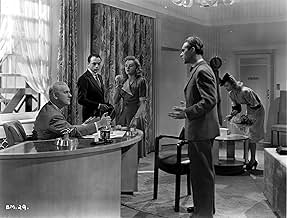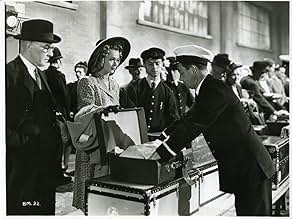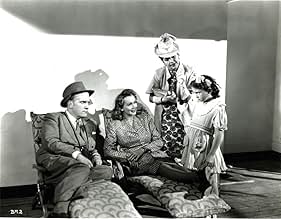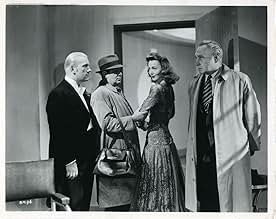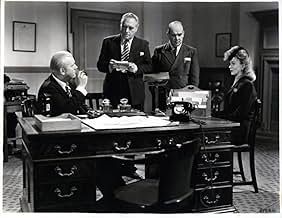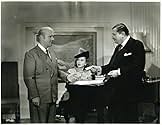Adicionar um enredo no seu idiomaRadio personality Carroll Levis becomes involved in a case of theft and murder.Radio personality Carroll Levis becomes involved in a case of theft and murder.Radio personality Carroll Levis becomes involved in a case of theft and murder.
- Direção
- Roteiristas
- Artistas
Terry-Thomas
- Terry Thomas
- (as Terry Thomas)
Gwyneth Vaughan
- Miss Hamilton
- (as Gwynneth Vaughan)
Avaliações em destaque
Ernest Thesiger wants an antique brass monkey from Japan, but it's stolen by a ring of do-badders which include Herbert Lom. To smuggle it through customs, it's given as a gift to Carole Landis, who gives it to radio personality Carroll Levis, who's playing radio personality Carroll Levis; he had a popular amateur hour show on the BBC in this period. The monkey becomes misplaced, and we get to witness a lot of amateur hour acts, including Terry-Thomas doing two of his routines.
It looks like it's going to turn into film noir -- how could it not, with Lom and Thesiger involved? -- but it never quite gets there. Instead the plot is dropped, and we get a show business story, with a girl contortionist, scatter-brained secretaries, and so forth, in Thornton Freeland's next-to-last time in the director's chair. Miss Landis committed suicide soon after appearing here. It was her last movie released in the United States, not making it into the theaters until 1951.
It looks like it's going to turn into film noir -- how could it not, with Lom and Thesiger involved? -- but it never quite gets there. Instead the plot is dropped, and we get a show business story, with a girl contortionist, scatter-brained secretaries, and so forth, in Thornton Freeland's next-to-last time in the director's chair. Miss Landis committed suicide soon after appearing here. It was her last movie released in the United States, not making it into the theaters until 1951.
Minor mystery notable mostly as the final film of Carole Landis before her suicide. The mystery is average but what makes this stand out is that approximately the final third of the picture shoves the main plot aside to present a variety show since the main male lead Carroll Levis, a well known radio personality of the time, could not act and to spare him and the audience they had him emcee this concoction containing some good musical performances and some weak comedy bits. Avril Angers, a noted comedienne, is saddled with a character that is supposed to be charmingly daffy but comes across as idiotic. As for Carole Landis the Ping Girl performs her part professionally although its obvious that the quality of her films was declining if this cheapie was the best that was being offered. If you aren't familiar with her she looks well, slim and well put together but once you realize that she was only 29 years old when this was made her appearance becomes shocking. She is dangerously thin and looks at least five to ten years older at times, plagued by the aftereffects of malaria and other diseases she had incurred while entertaining the troops during WWII plus a very messy private life the strain was obviously beginning to take its toll.
The logic is not quite watertight here. We all know who the murderer is throughout the film, and then in the end it proves that he isn't, instead it is the least probable of all the actors. So it is better to disregard this for its criminal credits to instead appreciate it for its brilliant entertainment value. The comedy enters with Avril Angers, the distracted secretary of the lead Carroll Lewis, who instead of being the lead is actually reduced to a supporting part. To avoid problems at the customs, Max Taylor, a weird type, gives over a brass monkey he has stolen to his fiancée Carole Landis, who carelessly puts in her purse to later give it to her manager Lewis, who entrusts it with his distracted secretary, who places it at a safe place which she later can't remember. Then people start murdering each other for this small insignificant brass statue, and it's impossible for anyone to get the head and tail of anything. The confusion in this monkey business is considerably magnified by the show having to get started, the best scene is the one in Lewis' office where everyone is waiting for him to give them a chance, including Terry-Thomas, who makes a formidable entry and practically steals the show. The finale of the film is the entire show staged for a radio broadcast, with brilliant performances by Avril Angers and other music hall artists, during which the police manage to sort things out. The mystery of the murders is resolved but hardly to any satisfaction to anyone.
"The Brass Monkey" is a low-budget comedy-thriller-cum-variety show of little artistic merit but maybe some slight curiosity value. It is most likely to appeal to viewers with a nostalgic interest in 1940s popular culture. It does have a story, concerning the efforts of Mr Ryder-Harris, a British convert to Buddhism, to recover three very precious and sacred brass figurines of the wise monkeys - hear no evil, see no evil, speak no evil - originally made for a Japanese temple. With the involvement of a crooked art dealer and his underworld associates, the quest for the stolen third monkey turns nasty and a couple of people are shot dead. But viewers will probably care no more about the details of all this than the writers and performers appear to have done. It is not a compelling tale.
Made in England by an American director, "The Brass Monkey" is an uneasy transatlantic mish-mash in respect of both style and casting. The plot-line and production values resemble those of American murder-mystery potboilers of the time, such as the Charlie Chan and Falcon series. The leading lady, Carole Landis, performs in full Hollywood glamour mode in modest British settings (Southampton and London) with a supporting cast of British character actors and light comedians. The central figure of the film, however - I hesitate to call him 'the star' - is Carroll Levis, playing himself. This prompts the question: who was Carroll Levis? To anyone watching the film, it is unnecessary to point out that he certainly wasn't an actor. Levis presented a popular radio variety show and was - we are told - "Britain's favourite Canadian". Ah, such fleeting fame! He may be envisaged as a precursor of Hughie Green, compère of "Opportunity Knocks", the old British television talent contest. At his side is Avril Angers, trying hard to get laughs in the guise of a silly secretary. Her patter is a weak imitation of American 'wise-cracking'.
The last third of the film is largely turned over to a succession of variety acts performed on the Carroll Levis radio show. Terry Thomas makes-up as an elderly man to sing "Somebody blew my bluebird egg" in a Swiss-German accent. Avril Angers delivers an energetic comic number about the housing shortage. Mr Fred Cross from London gives a rendition on the musical saw of "Believe me if all those endearing young charms". Winnie from Halifax plays "The Flight of the Bumble Bee" on her piano accordion. Meanwhile, the police inspector swiftly winds up the unengaging mystery. Occasional bursts of portentous music add unintended humour to this awkward confection of light entertainment.
Made in England by an American director, "The Brass Monkey" is an uneasy transatlantic mish-mash in respect of both style and casting. The plot-line and production values resemble those of American murder-mystery potboilers of the time, such as the Charlie Chan and Falcon series. The leading lady, Carole Landis, performs in full Hollywood glamour mode in modest British settings (Southampton and London) with a supporting cast of British character actors and light comedians. The central figure of the film, however - I hesitate to call him 'the star' - is Carroll Levis, playing himself. This prompts the question: who was Carroll Levis? To anyone watching the film, it is unnecessary to point out that he certainly wasn't an actor. Levis presented a popular radio variety show and was - we are told - "Britain's favourite Canadian". Ah, such fleeting fame! He may be envisaged as a precursor of Hughie Green, compère of "Opportunity Knocks", the old British television talent contest. At his side is Avril Angers, trying hard to get laughs in the guise of a silly secretary. Her patter is a weak imitation of American 'wise-cracking'.
The last third of the film is largely turned over to a succession of variety acts performed on the Carroll Levis radio show. Terry Thomas makes-up as an elderly man to sing "Somebody blew my bluebird egg" in a Swiss-German accent. Avril Angers delivers an energetic comic number about the housing shortage. Mr Fred Cross from London gives a rendition on the musical saw of "Believe me if all those endearing young charms". Winnie from Halifax plays "The Flight of the Bumble Bee" on her piano accordion. Meanwhile, the police inspector swiftly winds up the unengaging mystery. Occasional bursts of portentous music add unintended humour to this awkward confection of light entertainment.
10whpratt1
Over the years I have always admired everything that Carole Landis performed in on the Silver Screen. This was her last film before her untimely death and a friend loaned me the tape which I have always wanted to see. I was not disappointed in the story or the acting, however, Carole Landis was simply beautiful and very sexy in her final role and was able to keep this film from completely falling a part. I simply cannot understand why this film is not shown on our regular TV stations in America, it is truly a great Landis Film. However, a real great film that Carole Landis performed in was, "I Wake Up Screaming", along with many other great veteran actors. If you love her films, try and view this last Swan Song for Carole.
Você sabia?
- CuriosidadesCarole Landis filmed Brass Monkey at Twickenham Studios in England during the Fall of 1947. It was not released in the United States until 1951 - three years after her death. Some people incorrectly believe that it was her last film but she actually filmed "Noose" during January and February 1948.
- ConexõesEdited into Heroes of Comedy: Terry-Thomas (1995)
Principais escolhas
Faça login para avaliar e ver a lista de recomendações personalizadas
- How long is Brass Monkey?Fornecido pela Alexa
Detalhes
- Tempo de duração1 hora 40 minutos
- Cor
- Proporção
- 1.37 : 1
Contribua para esta página
Sugerir uma alteração ou adicionar conteúdo ausente

Principal brecha
By what name was Brass Monkey (1948) officially released in Canada in English?
Responda
